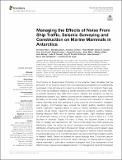Managing the effects of noise from ship traffic, seismic surveying and construction on marine mammals in Antarctica
Abstract
The Protocol on Environmental Protection of the Antarctic Treaty stipulates that the protection of the Antarctic environment and associated ecosystems be considered in the planning and conducting of all activities in the Antarctic Treaty area. One of the key pollutants created by human activities in the Antarctic is noise, primarily caused by ship traffic (from tourism, fisheries, and research), but also by geophysical research (e.g., seismic surveys) and by research station support activities (including construction). Arguably, amongst the species most vulnerable to noise are marine mammals since they specialise in using sound for communication, navigation and foraging, and therefore have evolved the highest auditory sensitivity among marine organisms. Reported effects of noise on marine mammals in lower-latitude oceans include stress, behavioural changes such as avoidance, auditory masking, hearing threshold shifts, and—in extreme cases—death. Eight mysticete species, 10 odontocete species, and six pinniped species occur south of 60OS (i.e., in the Southern Ocean). For many of these, the Southern Ocean is a key area for foraging and reproduction. Yet, little is known about how these species are affected by noise. We review the current prevalence of anthropogenic noise and the distribution of marine mammals in the Southern Ocean, and the current research gaps that prevent us from accurately assessing noise impacts on Antarctic marine mammals. A questionnaire given to 29 international experts on marine mammals revealed a variety of research needs. Those that received the highest rankings were 1) improved data on abundance and distribution of Antarctic marine mammals, 2) hearing data for Antarctic marine mammals, in particular a mysticete audiogram, and 3) an assessment of the effectiveness of various noise mitigation options. The management need with the highest score was a refinement of noise exposure criteria. Environmental evaluations are a requirement before conducting activities in the Antarctic. Because of a lack of scientific data on impacts, requirements and noise thresholds often vary between countries that conduct these evaluations, leading to different standards across countries. Addressing the identified research needs will help to implement informed and reasonable thresholds for noise production in the Antarctic and help to protect the Antarctic environment.
Citation
Erbe , C , Dähne , M , Gordon , J , Herata , H , Houser , D , Koschinski , S , Leaper , R , McCauley , R , Miller , B , Müller , M , Murray , A , Oswald , J , Scholik-Schlomer , A , Schuster , M , van Opzeeland , I & Janik , V M 2019 , ' Managing the effects of noise from ship traffic, seismic surveying and construction on marine mammals in Antarctica ' , Frontiers in Marine Science , vol. 6 , 647 . https://doi.org/10.3389/fmars.2019.00647
Publication
Frontiers in Marine Science
Status
Peer reviewed
ISSN
2296-7745Type
Journal article
Collections
Items in the St Andrews Research Repository are protected by copyright, with all rights reserved, unless otherwise indicated.

